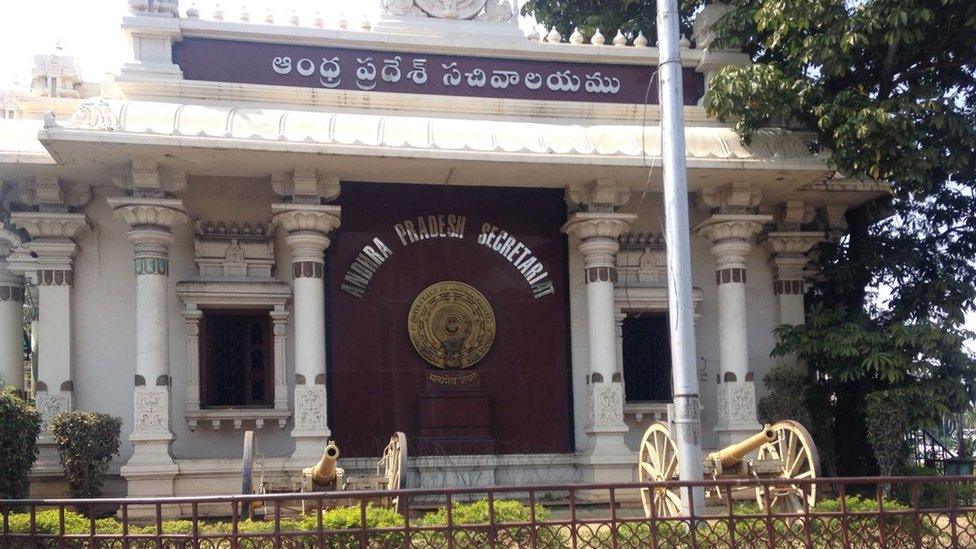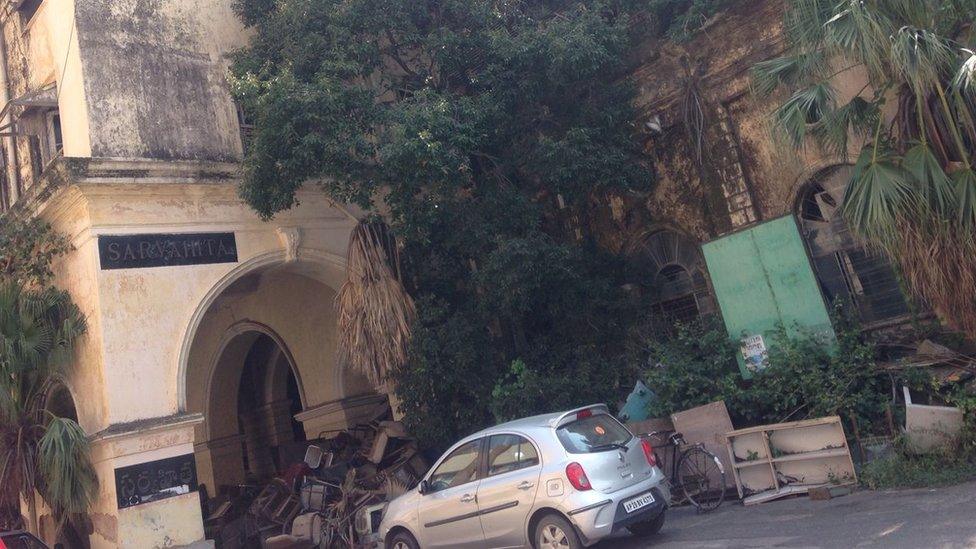The 'unlucky' building spooking an Indian minister
- Published

The 'unlucky' secretariat is set to be demolished
The chief minister of the south Indian state of Telangana is planning to raze a government complex and build a new one at an estimated cost of 3.5bn rupees ($52m; £42m) because he believes the building is unlucky for the state. TS Sudhir reports from Hyderabad.
The story of the "curse" of Saifabad Palace goes back to sometime in 1888.
The sixth Nizam (king) of Hyderabad, Mahboob Ali Pasha, was on his way to inspect the construction of the palace in what was then the kingdom of Hyderabad.
Two nobles, who did not want the Nizam to occupy the palace, ensured that a monitor lizard crossed his path - a bad omen. The Nizam immediately ordered the palace to be locked up.
It was only in the 1940s that a senior government official converted it into the administrative office of the kingdom.
India's costly 'feng shui' consultants
Nation mourns tree that 'failed' students
The feng shui way to a fortune
The Saifabad palace, now a heritage structure, is still at the centre of the present-day secretariat complex which houses the state governments of both Telangana and Andhra Pradesh. Hyderabad is currently the capital of both states, but will eventually belong only to Telangana.
Bad energies?
Like the sixth Nizam, the Telangana Chief Minister, K Chandrasekhar Rao, also believes that the secretariat complex is unlucky.
So he plans to raze the entire complex to the ground and build a new administrative centre.
He has such a strong aversion to the building that he hardly ever visits it - only once or twice a month for cabinet meetings. He prefers working out of his official residence in the city or from his personal estate, which is 60km (37.2 miles) from Hyderabad.

Mr Rao says the bad luck of the secretariat will affect the whole state of Telangana
Mr Rao believes the vaastu (similar to feng shui) of the secretariat is not good for Telangana. Vaastu is an ancient Hindu treatise of construction. Believers consider it a science, but critics dismiss it as mindless superstition.
"Definitely this secretariat has bad vaastu. History is proof that no-one has prospered because of this. Let Telangana not suffer," Mr Rao said.
Critics say this would not have been an issue if the complex was a crumbling, rickety structure that was endangering the life of the thousands of government employees working there. But much of the secretariat consists of recent constructions, which are less than a decade old.
Opposition politicians in the state have criticised the decision to "squander" public money in the pursuit of what they call Mr Rao's personal beliefs. Particularly, they argue that there is no objective standard of vaastu - it is different for every individual.
"If a new chief minister comes in later and he thinks this vaastu does not suit him, will we waste the taxpayer's money again?" Shabbir Ali, leader of the opposition in the Telangana Legislative Council, told the BBC.
'Undeterred'
"We should focus on building good governance but here we focus on building government buildings. The demolition is going to take place for a fancy purpose without assessing the existing facility," said political analyst K Nageshwar.
But Mr Rao is undeterred by the criticism. He has already met the governor of the state and asked him to tell his Andhra Pradesh counterpart Chandrababu Naidu to vacate his part of the secretariat and hand over the blocks for demolition.
The plan is to raze the entire complex by the end of this year and build a vaastu-compliant structure.
The only thing now standing in his way is the Hyderabad high court which has put on hold the demolition following a petition by an opposition legislator.
The Telangana government lawyer has told the court that the complex is being demolished for administrative convenience and because the building is a fire hazard.

The 19th Century Saifabad Palace was believed to be unlucky by its rulers
Opposition leaders say that is a strange argument since it is impossible to occupy any building in the city without a "no-objection certificate" (NOC) from the fire department.
Several people in Telangana and Andhra Pradesh do follow vaastu to determine the right wind flow and light inside an office or residential space. Others take it further - they use it to determine even little things like the direction the head of a department or ministry should face, and sometimes even the location of the toilets.
And it's not just the office that is on Mr Rao's list. Even his palatial official residence does not pass the test. He is getting a new one constructed and will move into it by the end of this month.
This building was constructed on the advice of vaastu experts by the former Andhra Pradesh chief minister YS Rajasekhara Reddy in 2005. He died in a helicopter crash four years later.
His successor, K Rosaiah, made some modifications on the advice of a vaastu expert but he lost power in a year.
His successor Kiran Kumar Reddy who does not believe in vaastu, and did not change anything in the office or residence space, survived the entire term.
"I only pray that Mr Chandrasekhar Rao does not decide tomorrow that the construction of the iconic Charminar in Hyderabad was not done according to vaastu principles in 1591 and is thereby declared inauspicious for Telangana," mocks opposition leader Shabbir Ali.